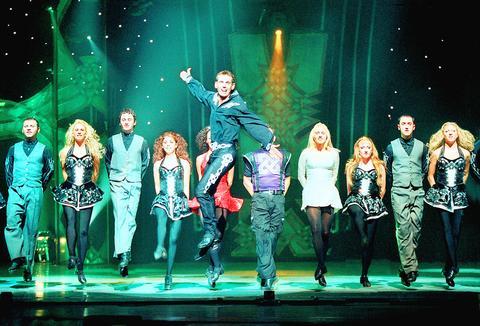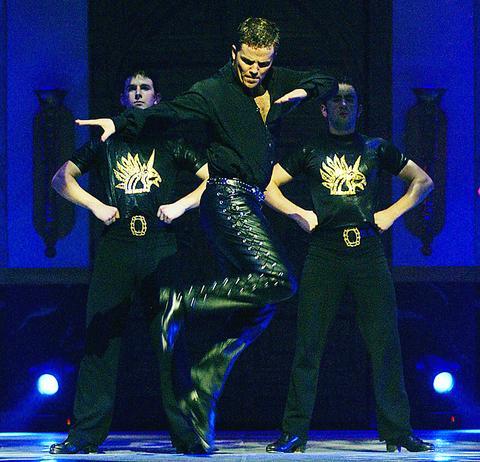In the past three years or so, there has been a growing tap dance craze in Taipei. On TV, a young girl does a solo tap dance on the balcony of European-style apartment, for a chicken stock commercial. In another ad, for instant coffee, a dancer taps his way through rainwashed streets while performing Gene Kelly's Singing in the Rain. Irish dance group The Spirit of Dance visited two years ago, as did Gaelforce last year. And this year, it is the turn of Lord of the Dance, which was founded by the renowned dancer Michael Flatley.
The group has already completed two shows, on Wednesday and yesterday, and there are five more shows to go. As expected, tickets are selling like hot cakes. So far 80 percent of the seats are gone and only a few that cost NT$3,200 are left. The attraction of Irish dance is obviously still powerful for Taiwan audiences.
Some traditional Irish dancers may be turning in their graves, but Celtic dance mixed with modern choreography and pyrotechnics is now popular in both Broadway and Las Vegas. Dancers now wear heavy and vivid make-up and proudly show off their bodies. They dance in orderly lines and raise their arms and a burst of fire erupts from the stage. It has come a long way from the traditional Irish dance previously performed in a pub, town hall or square.

PHOTO COURTESY OF KHAM ARTS
In 1998, Michael Flatley and the Lord of the Dance group of 120 dancers drove an audience of 25,000 in London's Hyde Park crazy with the groundbreaking production Feet of Flames. It then packed out Wembley Stadium for 21 consecutive nights.
Lord of the Dance is so popular around the whole world that it takes three troupes to meet with the demand for shows. In just seven years, Lord of the Dance has performed in more than 30 countries, achieving box office returns of US$400 million, 12 platinum record awards for their VCD/DVD sales, plus CD sales of 10 million.
Michael Flatley, the founder and artistic director of the Lord of the Dance (and the man who became the fastest tap dancer in the world in 1996 at 35-steps-per second; a record later broken by Michael Donnellan with 40-steps-per second), was without doubt the inspiration behind the world-wide popularity of the show.

PHOTO COURTESY OF KHAM ARTS
The former lead dancer of River Dance, Flatley left the troupe in 1996 and formed Lord of the Dance. In conjunction with composer Ronan Hardiman, Flatley developed a dance style that was more Irish, more powerful and more energetic than River Dance.
Flatley's charisma is a key to the popularity of Lord of the Dance. When he shows up on stage, he likes to run into the center of the stage with force and is greeted by cheers and screams from the audience. He has rock-star status.
In Taiwan, a fanclub and Web site dedicated to Flatley was started three years ago. Hundreds of his Taiwanese fans voluntarily translate information and news about the troupe into Chinese. For the first visit of Lord of the Dance to Taiwan, the club encouraged its members to promote and buy tickets.

PHOTO COURTESY OF KHAM ARTS
Because of the fervor of his fans here perhaps, although Flatley could not make it for the Taipei performances, he sent a message: "Our show allows us the unique opportunity to bring a little touch of Ireland to the international stage and lets our audience savor the excitement and enjoy it for themselves. Although I will not be in Taipei, I am pleased that our show has been invited to perform there," the message from Flatley said.
Lord of the Dance is now divided into three troupes. The fourth troupe will be established in March this year. The group coming to Taipei is Troupe 1, led by former dance champion Damian O'Kane, who will be playing Flatley's original role as the lord of the dance. Together with 40 dancers and 10 musicians, Troupe 1 will undoubtedly move the Taipei International Convention Center for the next three days.
"We will bring the best to our Taiwan audience. And we guarantee the entertainment will not be a tiny bit less than our shows elsewhere," said O'Kane on Tuesday at their Taipei press conference.

Dissident artist Ai Weiwei’s (艾未未) famous return to the People’s Republic of China (PRC) has been overshadowed by the astonishing news of the latest arrests of senior military figures for “corruption,” but it is an interesting piece of news in its own right, though more for what Ai does not understand than for what he does. Ai simply lacks the reflective understanding that the loneliness and isolation he imagines are “European” are simply the joys of life as an expat. That goes both ways: “I love Taiwan!” say many still wet-behind-the-ears expats here, not realizing what they love is being an

Google unveiled an artificial intelligence tool Wednesday that its scientists said would help unravel the mysteries of the human genome — and could one day lead to new treatments for diseases. The deep learning model AlphaGenome was hailed by outside researchers as a “breakthrough” that would let scientists study and even simulate the roots of difficult-to-treat genetic diseases. While the first complete map of the human genome in 2003 “gave us the book of life, reading it remained a challenge,” Pushmeet Kohli, vice president of research at Google DeepMind, told journalists. “We have the text,” he said, which is a sequence of

Every now and then, even hardcore hikers like to sleep in, leave the heavy gear at home and just enjoy a relaxed half-day stroll in the mountains: no cold, no steep uphills, no pressure to walk a certain distance in a day. In the winter, the mild climate and lower elevations of the forests in Taiwan’s far south offer a number of easy escapes like this. A prime example is the river above Mudan Reservoir (牡丹水庫): with shallow water, gentle current, abundant wildlife and a complete lack of tourists, this walk is accessible to nearly everyone but still feels quite remote.

It’s a bold filmmaking choice to have a countdown clock on the screen for most of your movie. In the best-case scenario for a movie like Mercy, in which a Los Angeles detective has to prove his innocence to an artificial intelligence judge within said time limit, it heightens the tension. Who hasn’t gotten sweaty palms in, say, a Mission: Impossible movie when the bomb is ticking down and Tom Cruise still hasn’t cleared the building? Why not just extend it for the duration? Perhaps in a better movie it might have worked. Sadly in Mercy, it’s an ever-present reminder of just